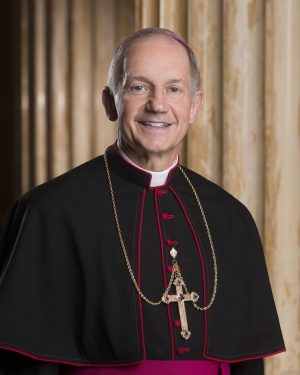
NEW YORK — Bishop Thomas Paprocki says the U.S. bishops need to continue a dialogue and mend the division among the nation’s prelates.
He was writing about the drafting of the document on Eucharistic coherence, which some bishops claim risks politicizing Communion.
“If there is division among the bishops, which it appears sadly that there is, unity will not be achieved by everyone keeping silent about the issues that divide us,” wrote Bishop Paprocki, the bishop of Springfield in Illinois. “The only way to heal the division is to confront it and dialogue about it until there is a consensus about the truth of the matter.”
Bishop Paprocki is the latest bishop to speak out about the vote to draft the document — the topic that dominated last week’s United States Conference of Catholic Bishops (USCCB) spring assembly. On June 18, after two days of spirited discussion, the bishops voted 168-55 to draft the document.
Notable bishops against drafting the document included Cardinals Blase Cupich of Chicago, Joseph Tobin of Newark, and Wilton Gregory of Washington, who argued it would be divisive.
Bishop Paprocki called this claim “misleading.”
“One of the misleading arguments voiced by some bishops and cardinals opposed to drafting this document was that doing so would be divisive and would harm the unity of the bishops’ conference,” Bishop Paprocki wrote. “Yes, we should strive for unity, but our unity should be based on the truths of our faith as found in Sacred Scripture and constant tradition of the church.”
He also cited the thorough process of drafting the document as key to continuing dialogue. In a recent conversation with Our Sunday Visitor, Bishop Kevin Rhoades of Fort Wayne-South Bend, chair of the USCCB doctrinal committee chair, outlined that the process of finalizing a draft will include input from meetings of bishops throughout the country, several other USCCB committees, and the Congregation for the Doctrine of the Faith.
The final draft will be presented to the full body of bishops at its next meeting in November where it will be subject to amendment proposals and debates before a final vote.
Another point of concern for those opposed to drafting the document was a belief that it was aimed at pro-choice Catholic politicians, in particular President Joe Biden. Rhoades pushed back against the claim at the assembly and maintained that it wasn’t aimed at any one person, but instead a teaching document for all Catholics.
Bishop Paprocki wrote that the section in question on “Eucharistic consistency” is there “to address the obstacles to Eucharistic communion posed by ‘the problem of serious sin’ of any kind, not just abortion and euthanasia.”
“It has been the constant teaching of the Catholic Church for the past two thousand years that those persons conscious of grave sin must first repent, confess their sins to a priest, and receive sacramental absolution before receiving holy Communion,” Bishop Paprocki wrote.
Cardinal Seán O’Malley, who has been relatively silent on the drafting of the document, however, noted on his blog that at one point the document was aimed at public figures.
“I think early on, there were some who envisioned the document as dealing with public figures and the reception of the Eucharist,” Cardinal O’Malley wrote. “However, in light of the instructions from the Holy See, the Committee on Doctrine has adjusted it to avoid focusing on categories of individuals but trying to develop a theological document around the Eucharist.”
Cardinal Luis Ladaria, head of the Vatican’s Congregation for the Doctrine of the Faith, sent a letter urging the bishops to have dialogue amongst each other and pro-choice politicians within their jurisdictions.
Bishop Paprocki also took aim at the media for perpetuating “false narratives” and “misleading arguments” about the document and guidance from Ladaria.
A number of bishops made similar claims during the spring assembly discussion.
Bishop Lawrence Persico of Erie, in Pennsylvania, called the initial reporting on the vote “inaccurate” in a statement and maintained that the draft is on the importance of the Eucharist for all Catholics.
Bishop Douglas Lucia of Syracuse issued a statement where he too called out the media for implying the document was aimed at certain individuals.
“The media is missing the point; this document is only in its drafting stage and will be accompanied by consultation with a variety of persons, including politicians,” he said.
